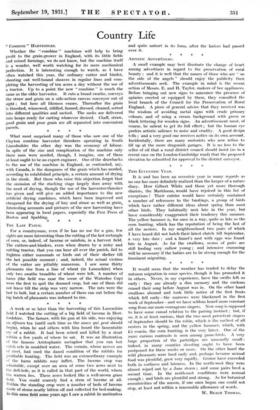It would seem that the weather has tended to delay
the autumn migration in some species, though it has promoted it in others. Never, in my experience, have the swifts left so early : they are already a dim memory and the cuckoos ceased their song before August was in. On the other hand swallows abound and took little notice of the first frosts which fell early—the marrows were blackened in the first week of September—and we have seldom heard more constant song from our more courageous singers. Now song is supposed to have some causal relation to the pairing instinct ; but, if so, it is at least curious, that the two most persistent singers of September should be the robin, which is the earliest of all
nesters in the spring, and the yellow hammer, which, with its cousin, the corn bunting, is the very latest. One of the more curious contrasts is seen among game-birds. A very large proportion of the partridges are unusually small : indeed, in many counties shooting ought to have been postponed for three weeks or more. On the other hand the wild pheasants were bred early and, perhaps because animal food was plentiful, grew very rapidly. Grouse have exceeded both in earliness and lateness. In the north-west they were almost wiped out by a June storm ; and some pairs bred a second time. In the north-east conditions were normal enough ; and birds are plentiful and strong. As for botanical eccentricities of the season, if one once began one could not stop, at least not within a reasonable allowance of words.
W. BEACH THOMAS.


































 Previous page
Previous page